Content Marketing Tips & Strategies for Law Firms
May 15, 2025
Content marketing for law firms is the art of creating valuable legal content on topics that are helpful for prospective and current clients.
You need to consider the questions clients might ask a lawyer and what goes through their minds when seeking legal advice, in order to identify the most relevant topics for your content.
In this article, I will share the best tips for creating legal content for attorneys and law firms.
What is Content Marketing for Law Firms?
Content marketing for law firms is the practice of writing and distributing high-quality and E-E-A-T-friendly content to build a solid reputation amongst your target audience.
Legal content marketing for attorneys and legal consultants includes:
- Preparing expert-written blog posts on different niche-specific legal topics that your prospective clients might search on Google and other search engines.
- Creating detailed FAQs that answer common legal questions your audience has.
- Publishing client case studies or success stories (anonymized if necessary) to build trust and credibility.
- Developing downloadable legal guides, checklists, or templates to help users navigate legal processes.
- Producing informative videos or webinars on legal issues, procedures, or recent law changes.
- Sharing legal tips and updates on social media to educate and engage your audience.
- Sending newsletters with curated legal insights, news, and blog highlights to stay top-of-mind of your target audiences.
- Writing pillar pages and topic clusters to improve SEO and establish topical authority.
- Hosting podcasts on legal topics to reach broader audiences.
- Offering live Q&A sessions or AMAs to directly address audience concerns in real time.
Is Content Marketing Effective for Law Firms?
Yes, content marketing is extremely effective for attorneys. People want legal clarity before they pay for a consultation.
Hence, law firms that regularly publish blogs, legal updates, FAQs, case studies, and helpful guides build trust faster.
Here are the top reasons why content marketing for lawyers is so effective:
Establishes Authority and Trust
High-quality content production builds trust and credibility by helping you showcase your expertise in legal matters.
Authoritative content is liked by users and search engine algorithms.
Well-researched, expert-written or reviewed, accurate, fresh, and unbiased content places your website among the top online resources known for producing legally helpful content.
Improves Search Engine Visibility
Consistently publishing legal content helps your firm show up in organic search results for key terms that potential clients are already typing into Google.
Search engines reward fresh, relevant, and structured content. When you publish detailed blogs, local service pages, and answers to common legal questions, you improve both visibility and click-through rates.
As a result, your website acquires qualified audiences who need legal help.
Attracts and Nurtures High-Intent Leads
Legal content marketing speaks to people who are looking for solutions to their legal problems in their region.
When someone finds a helpful blog post or guide that clearly explains their situation, it builds confidence in your firm.
They feel like they have already been helped, which makes them more likely to reach out, trust your advice, and become long-term clients.
Differentiates You from Competing Firms
Value-driven content marketing differentiates your legal firm from other competing consultancies in your area. People-first content marketing helps your law firm build authority in your target market.
When you reach prospective clients at each of the buyer journey stages, they remember your law firm. With increased trust and topical authority, you dominate the local searches.
Supports Other Digital Marketing Channels
One of the biggest advantages of legal content marketing is that it fuels the entire digital strategy for your law firm.
A single blog post can be repurposed into an engaging social media post, email newsletter, or downloadable legal guide.
Content also powers SEO, strengthens PPC landing pages, and adds depth to client education resources.
Unlike paid ads, which disappear when the budget runs out, quality content continues to attract and convert visitors long after it's published.
Content Marketing for Law Firms: Tips and Strategies
Here are the top content marketing tactics for lawyers and law firms:
Create Content that is Really Helpful and Relevant
Google’s ranking algorithm promotes content that is reliable and people-first.
Content that is crafted to please search engines and not users do not perform well in terms of gaining higher organic rankings.
You should craft content that is original, complete, accurate, and verified by legal experts.
There should not be any factual errors, and all sources of facts should be specified. Also, the background of the author should be clearly mentioned with real expertise on the topic.
For example, Howie Sacks & Henry LLP publishes detailed blog posts on personal injuries. The blog authors are carefully selected based on their expertise.
The below article on worker injury is authored by a personal injury and employment lawyer.

Similarly, content related to medical malpractice is written by a medical malpractice lawyer working for their firm.
Google's automated systems consider four important content factors called E-E-A-T to rank great content.
These are:
- Experience: The author should have first-hand experience on the topic.
- Expertise: The content should be written by a skilled and knowledgeable person in the topic niche.
- Authoritativeness: The website should have topical authority on the content topic.
- Trustworthiness: The content should be correctly attributed and sourced.
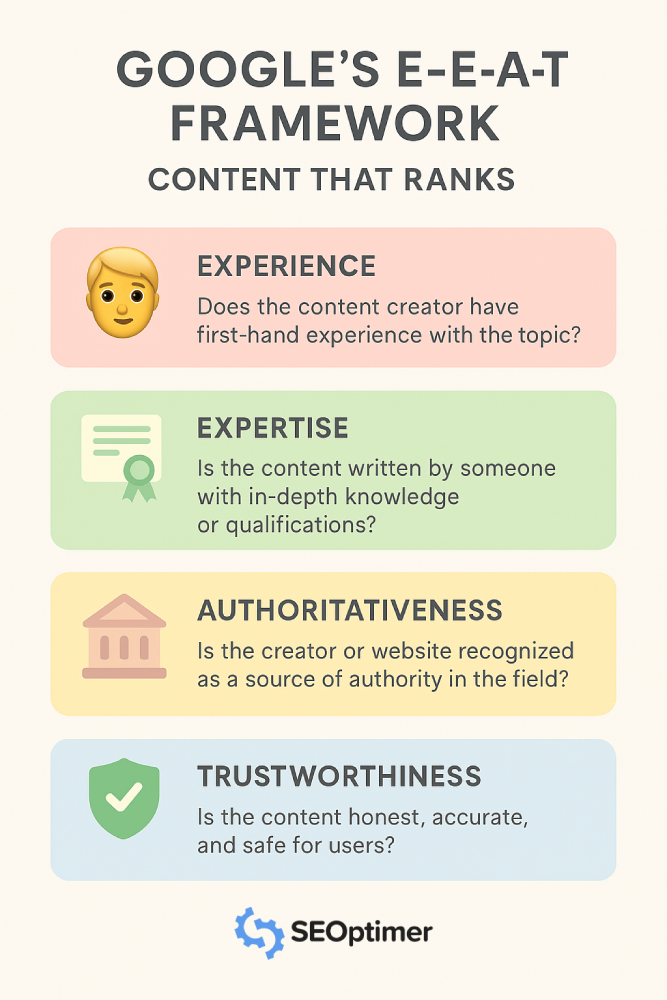
Your content should not always demonstrate all of them. Depending on the topic and the search query relevance, sometimes helpful content based on experience might be preferred, while sometimes, content demonstrating expertise might win.
The below figure displays the page quality rating that Google systems assign to a page depending on how well the page achieves its purpose.
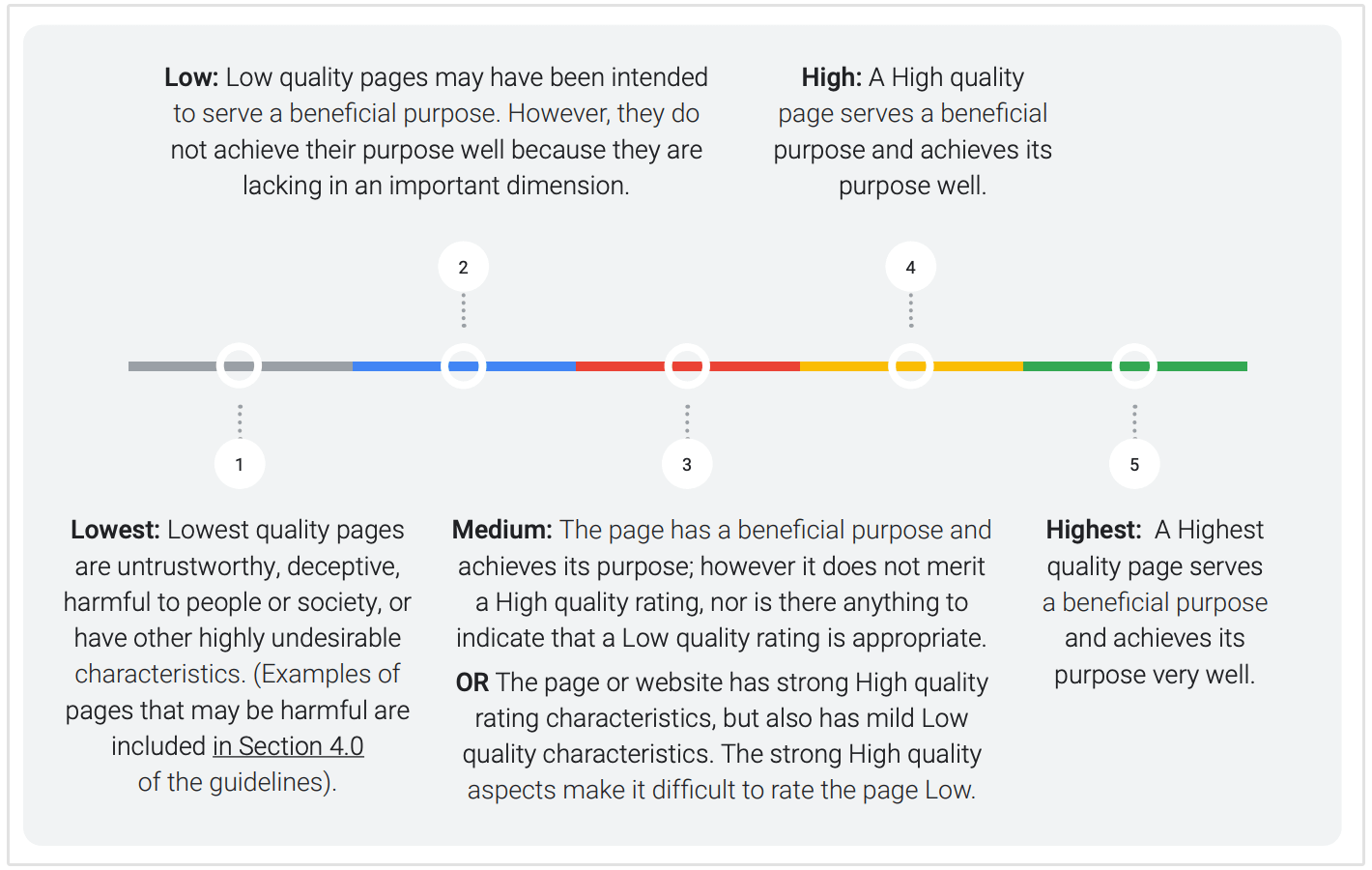
Overall, you should aim for a strong E-E-A-T score for your content and achieve topical authority for your domain in the legal niche.
Also, since legal matters fall under the YMYL “Your Money Your Life” category, Google systems give even more weight to great E-E-A-T content as it directly impacts the financial stability, safety, and well-being of society.
Create Content for Clients at Different Stages in the Funnel
The buyer’s journey consists of four stages:
- Awareness
- Consideration
- Decision
- Retention
You should create well-researched and intent-specific content for each stage of the legal buyer journey.
Both long-form and short-form content can be created depending on your target keywords.
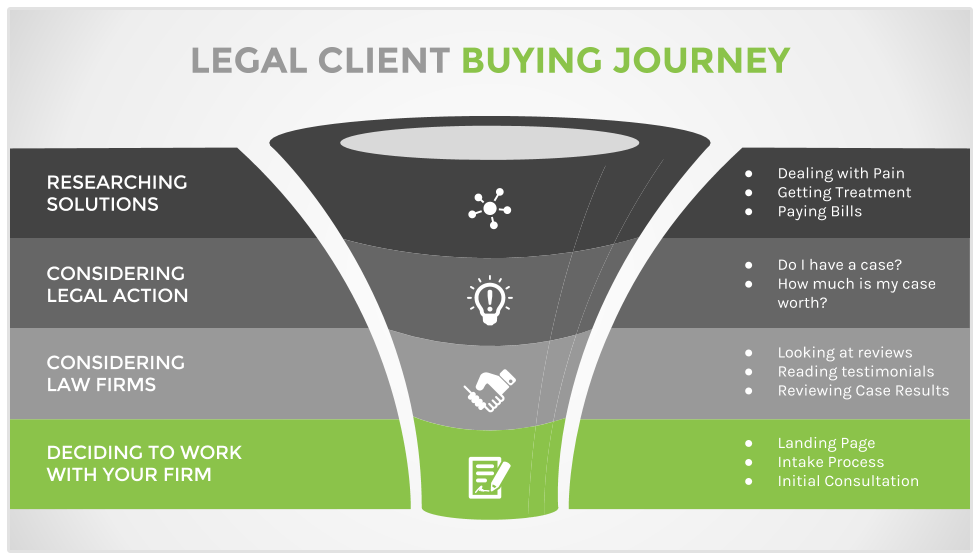
Your goal as a legal content creator is to meet potential clients where they are in this journey.
Rachel Amies from Crazy Digital Creative, a digital agency based in Sydney, sums this up perfectly:
The key is to write web and blog content that speaks directly to the law firm's ideal client, empathizes with their situation and clearly guides them towards taking the next step. It's all about creating a client journey, not simply ranking well.
- Rachel Amies, Founder at Crazy Digital Creative
Let’s understand how you can effectively attract audience attention in each of the four legal buyer funnel stages:
Awareness Stage: Educate and Build Initial Trust
In this first stage of the legal client journey, a person becomes aware that they might have a legal issue.
They may not fully understand the legal problem and may not be sure what sort of legal help they need.
In the legal awareness stage, you can reach prospects with informative blog posts, guides, or social media content that explains specific legal issues in simple, accessible language.
For example, Salinas law firm is an immigration attorney that has created content related to work visas to reach prospects when they are unsure whether they need an attorney for this purpose.


Consideration Stage: Offer Insight and Clarify Options
Once the potential client understands their problem, they begin researching possible solutions.
They may compare hiring a lawyer versus handling the issue on their own or look into the different types of legal services available. Here, your content should provide depth and guidance.
In the consideration stage, you should create detailed content pieces explaining the pros and cons of different legal strategies.
You can also offer downloadable resources like step-by-step legal guides.
For instance, domestic litigation firm Cordell & Cordell offers downloadable guides related to divorce issues and settlements to help their prospective clients.
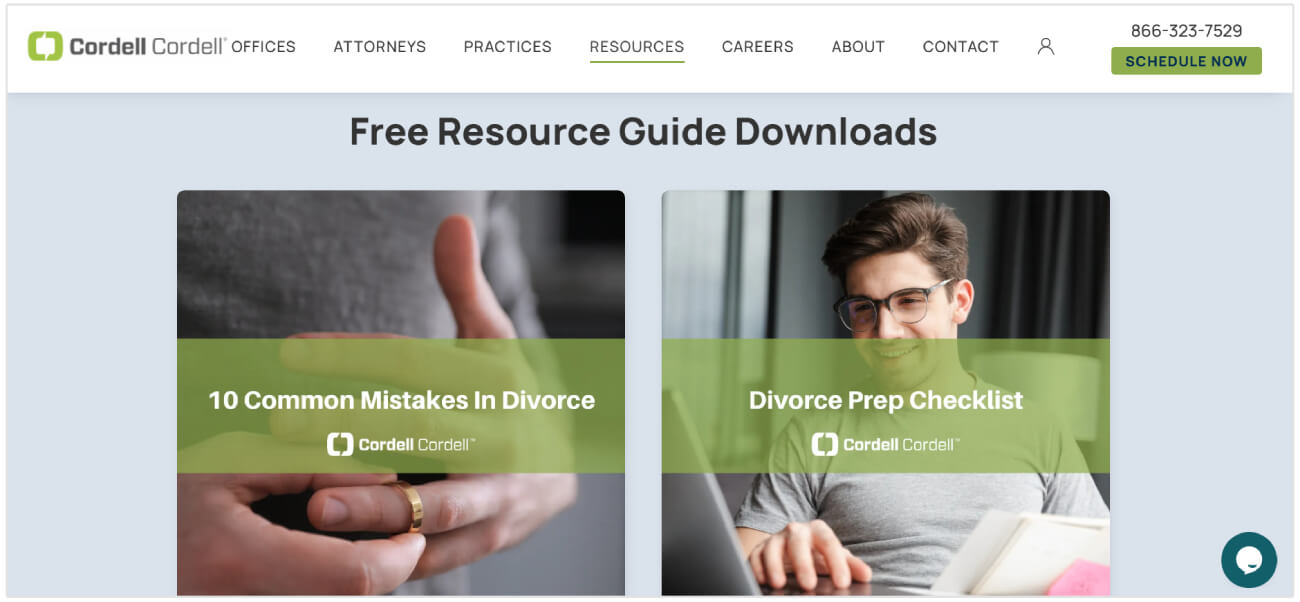
Decision Stage: Reassure and Convert
By this point, the client has decided they need legal help and is choosing who to hire. This is your chance to prove that your law firm is the right choice.
Your content should clear all the doubts that your prospective clients might have and reinforce trust. They should be assured that your legal consultancy is the right choice for them.
You should display client reviews, awards, case studies, and other recognitions your law firm has received to ensure your client selects your firm over your competitors.
For example, John Foy & Associates display their client reviews under the primary page title to attract the attention of their audiences. They also display their client testimonials in the right sidebar to build client trust.

Retention Stage: Nurture Relationships and Encourage Referrals
Even after a case is closed, the journey isn’t over.
Clients who’ve had a good experience are more likely to return for future legal needs or refer others if you stay connected.
Retention content should be personal and relationship-driven.
You might send regular newsletters with legal tips, offer referral incentives, send thank-you notes and updates on related legal news.
You can also create content that educates past clients about other services you offer, reminding them that you're not just a one-time solution.
Find Relevant Keywords and Topics for Your Blog
Once you have outlined the legal buyer journey stages depending on the legal service your firm offers, you should find relevant keywords and topics.
Use a keyword research software like the SEOptimer keyword research tool to find good keywords that can help you solidify your branding and drive more client appointments.
You can enter your primary keyword in your target location, and SEOptimer will show you the top related search terms along with their monthly search volume, CPC data, and competition level.
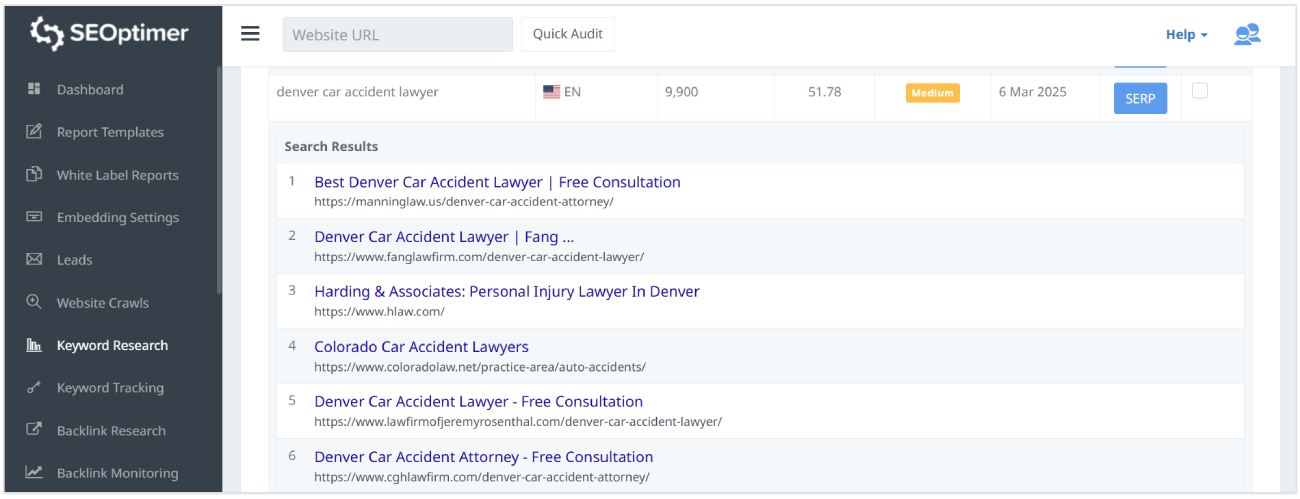
You can even enter your competitor’s domain to see all the search terms the site ranks for.
Depending on the different legal disputes whose solution your law firm offers, you should pick the most relevant keywords that have low to medium competition and a fair search volume.
Here are some sample topics to target at the awareness stage:
| Keyword | Content Type | User Intent |
|---|---|---|
| what happens if I slip at work | Blog post / FAQ | Understanding rights after an accident |
| signs of medical malpractice | Informational article | Learning if they have experienced malpractice |
| is divorce emotionally difficult | Blog post / Guide | Exploring the emotional and legal impact |
| can I sue for emotional distress | Educational video / Post | Discovering legal possibilities |
| what to do after a minor car accident | Checklist / How-to guide | Seeking immediate steps to take |
Here are some topics to cover in the consideration stage of the legal buyer journey:
| Keyword | Content Type | User Intent |
|---|---|---|
| personal injury claim vs. lawsuit | Comparison blog | Evaluating legal paths |
| should I get a lawyer for a DUI | Guide / Explainer | Deciding whether legal help is needed |
| best ways to settle a custody dispute | In-depth article | Understanding resolution options |
| how long does a medical malpractice case take | FAQ / Timeline infographic | Researching process duration |
| alternatives to going to court for divorce | Educational guide | Exploring non-litigation options |
In the decision stage, the client knows what to search, and here are some of the keywords to target depending on your target locations:
| Keyword | Content Type | User Intent |
|---|---|---|
| best family law attorney near me | Landing page / Attorney profile | Looking to hire |
| affordable personal injury lawyer | Service page / Pricing page | Price-sensitive decision making |
| DUI lawyer free consultation | CTA page / Contact form | Ready to talk to a lawyer |
| top-rated workers comp attorneys | Testimonials / Reviews | Comparing firms based on reputation |
| hire a lawyer for medical negligence case | Case study / Why choose us page | Looking for expertise |
Republish and Update Old Content
Search engines prioritize relevant, accurate, and up-to-date content.
Most legal businesses publish content regularly, but very few of them update content to maintain its freshness.
You should republish old content by adding new statistics, comparison tables, the latest legal regulations and acts, and other facts to make them super relevant and useful for the user.
Keeping your content on track with legislative changes and emerging trends is a great way to inform your audiences about the most recent findings.
Search engines tend to prefer content that is fresh, high-quality, and contains the most current statistics.
Repurpose Content for Other Channels
Another popular content marketing tip for law firms is to republish content on multiple social media platforms.
Repurposing content helps to extend the content lifespan and reach.
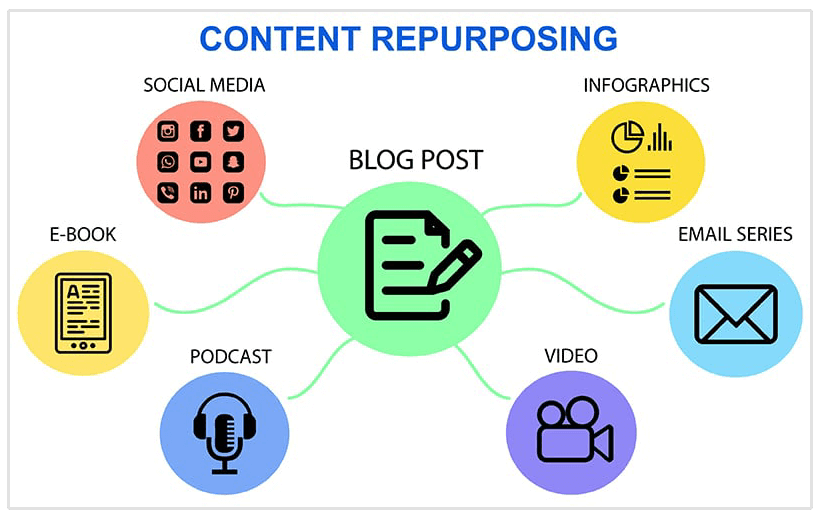
To repurpose your legal content, you should identify the top-performing pages on your site using Google Analytics or Search Console.
Once identified, you should pick different formats for repurposing depending on the channels where you prefer to post them.
For example, you can publish a legal blog post on your website and then repurpose the important sections into a video to share it across your social channels.
You can repurpose existing content to different formats, such as newsletters, videos, podcasts, and infographics.
Add Trust Factors to Blog Posts
In legal content writing, adding trust factors to blog posts is essential for establishing authority and reputation in the eyes of both search engines and potential clients.
A blog that addresses legal misconceptions, breaks down complex legal concepts, and explains legal processes in plain, accessible language can go a long way in building confidence.
However, to truly stand out, every legal article should include key elements that reinforce credibility.
Include a detailed bio under each article that highlights why the author is experienced on the topic, showcasing the lawyer’s achievements and qualifications as well as the law firm's awards.
Law firms can speak to these factors by ensuring published content has an author bio written by a certified expert on their team, and by referencing relevant awards, accreditations and testimonials in bios and in other relevant pieces of content. This helps build trust, credibility and authority.
- Emma Williams, Founder & CEO at Seene Digital
It will help to boost transparency and also strengthen entity relationships between the author, the legal subject, and the firm.
Strong legal blog writing depends on clarity and authority. You should write for your clients by providing clear and compelling answers to the questions they are actually searching for. Include credible statistics from government or legal sources to enhance the factual value of the content, reinforcing its reliability.
Make sure your blog content reflects strong writing and research, as this signals quality to both human readers and Google search systems.
Embedding the author’s credibility further means linking to the author's social media profiles and showing their previous contributions, helping Google build accurate content vectors and author vectors.
Showcase the merits of your firm, mention case experience, video testimonials, client outcomes, and any proprietary approach or insight your firm offers.
Do not underestimate the power of client testimonials and case studies. Law firms are in a trust-based industry so showcasing real stories from clients can go a long way in building credibility.
- Dorian Menard, Founder of Search Scope
So when you're building your law firm's website and layout, try to include sections with ratings and reviews to add a community-backed layer of validation that’s hard to ignore.
For example, Morgan & Morgan leverages video feedback from their clients and 5-star ratings as accomplishments to raise client trust in their services.
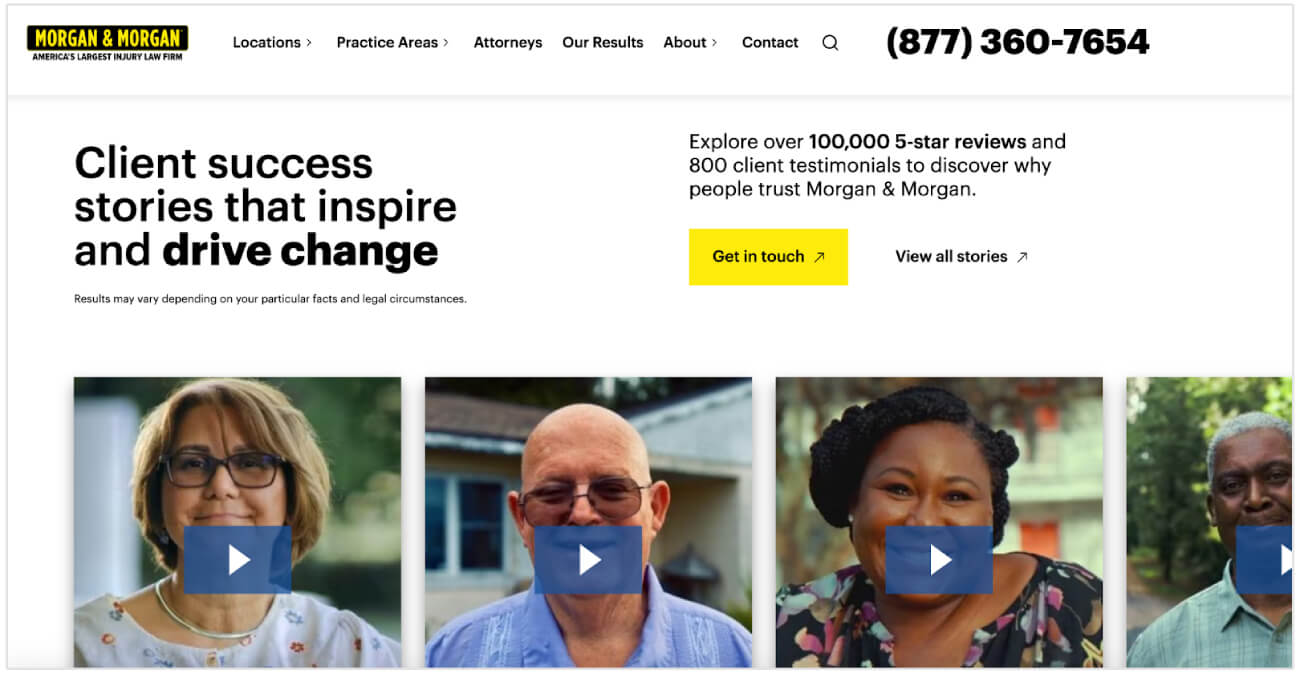
Optimize Blog Posts for SEO
If you do not optimize your legal blogs, the chances of ranking will be lower.
You should optimize your content to help it rank higher in organic searches and increase the chances of attracting new client appointments.
Understand what your users are trying to achieve.
Ask yourself if they are looking for legal definitions, comparing options, or ready to contact a lawyer?
Once the search intent is clear, choose the appropriate content type (such as a blog post, FAQ, case study, or checklist), format (text-based article, infographic, or video), and content angle (e.g., local expertise, practical solutions, legal timelines).
Your content should include carefully selected target legal keywords based on how your audience searches for information. Use your primary keywords in the page title, main body, and especially in the headings, which help both users and search engines navigate your article.
Also, don’t limit yourself to just the exact match keywords.
Use semantic variations of the main keyword to cover a broader range of related queries and demonstrate topic relevance.
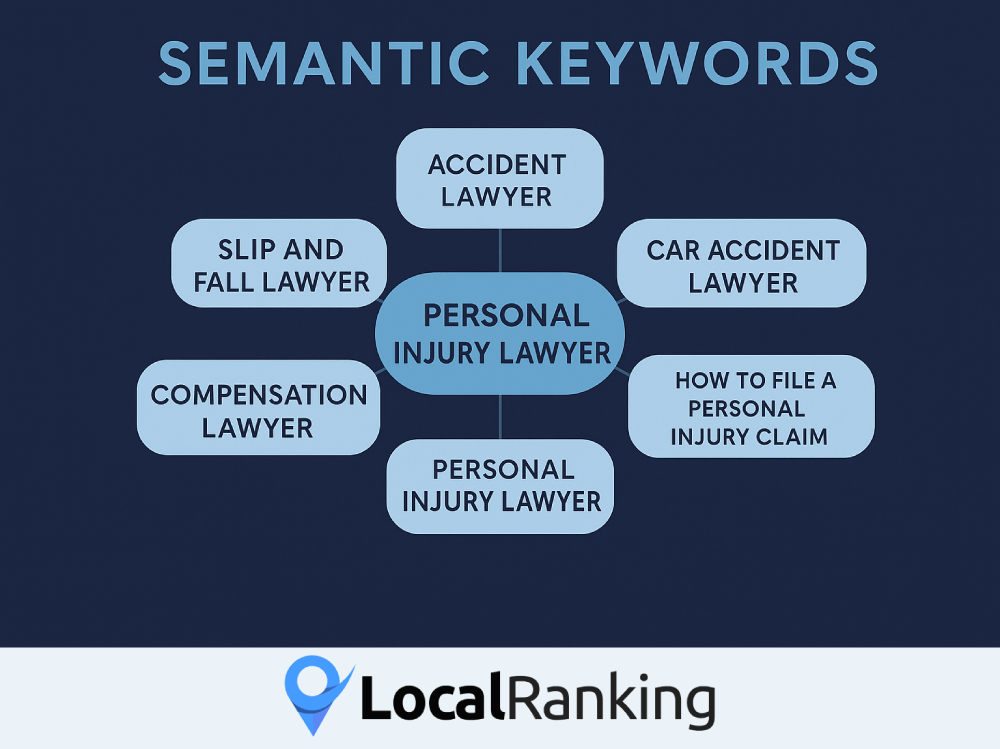
To further improve visibility, structure your content in a way that helps you optimize for featured snippets:
- Use descriptive subheadings
- Giving clear definitions
- Answer commonly asked questions directly
- Use simple formatting like bullet points where appropriate
Add images and GIFs to visually explain legal processes, as well as videos for complex concepts to enhance user engagement and signal content quality.
Keep your language clear and digestible; use simple words, short sentences, and avoid jargon unless absolutely necessary.
Technical terms should be explained for a lay audience. Additionally, use an SEO-friendly URL that includes the target keyword and reflects the page topic accurately.
Conclusion
To grow your client base and increase business exposure, you should focus on creating helpful content that highlights your unique value proposition.
Attorneys should build topic clusters around key legal services and align content with their geographic location to attract relevant organic traffic. You should treat legal content as an asset that strengthens domain reputation and provides valuable legal support.
A strong content strategy helps you form lasting relationships and position your firm as a trusted authority in the legal space.




